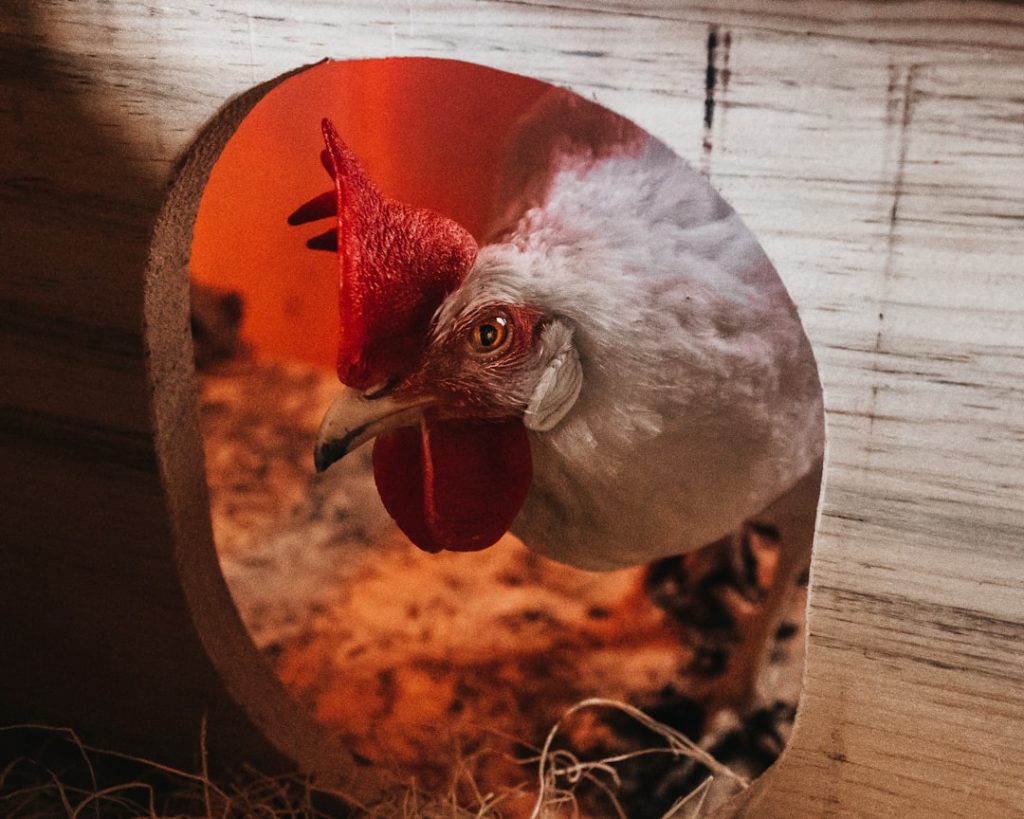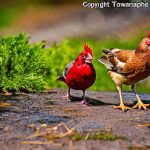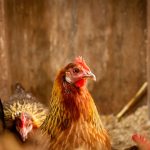The comb of a chicken is a fleshy, red protuberance atop its head that serves multiple functions, including thermoregulation and mate attraction. Freezing of the comb can lead to severe health complications for chickens. The comb’s delicate blood vessels are susceptible to freezing in cold temperatures, potentially resulting in frostbite.
Frostbite can cause tissue damage, infection, and, if left untreated, may lead to death. Furthermore, a frozen comb can impair a chicken’s ability to regulate its body temperature, potentially causing hypothermia. For these reasons, it is essential for poultry keepers to prevent their chickens’ combs from freezing to maintain optimal health.
Frozen combs can also have long-lasting effects on a chicken’s health and productivity. Even if a chicken survives frostbite, it may suffer permanent damage to its comb, affecting its thermoregulatory abilities and potentially impacting egg production. In severe cases, amputation of a frozen comb may be necessary, which can be traumatic for the chicken and may lead to additional health issues.
Therefore, preventing comb freezing is crucial not only for the immediate well-being of chickens but also for their long-term health and productivity.
Table of Contents
- 1 Providing proper shelter and insulation for your chickens
- 2 Utilizing heat lamps or heated waterers to prevent freezing
- 3 Implementing a regular inspection routine for frostbite prevention
- 4 Adjusting your chickens’ diet to support their cold weather needs
- 5 Using natural remedies to protect your chickens’ combs from freezing
- 6 Monitoring weather forecasts and taking proactive measures to prevent freezing
- 7 FAQs
Key Takeaways
- Keeping chicken combs from freezing is important to prevent frostbite and maintain the overall health and well-being of your chickens.
- Providing proper shelter and insulation for your chickens can help protect them from extreme cold and prevent their combs from freezing.
- Utilizing heat lamps or heated waterers can help maintain a comfortable temperature for your chickens and prevent their combs from freezing.
- Implementing a regular inspection routine for frostbite prevention can help identify any issues early and take necessary measures to protect your chickens’ combs.
- Adjusting your chickens’ diet to support their cold weather needs, such as providing high-energy foods, can help them stay warm and prevent their combs from freezing.
- Using natural remedies, such as applying petroleum jelly, can help protect your chickens’ combs from freezing in a safe and effective manner.
- Monitoring weather forecasts and taking proactive measures, such as adding extra bedding or adjusting the heating in the coop, can help prevent freezing and protect your chickens’ combs.
Providing proper shelter and insulation for your chickens
Insulating the Coop
A well-constructed coop with adequate insulation can help maintain a comfortable temperature for the chickens, reducing the risk of frostbite. Ensure that the coop is free from drafts and that there are no gaps or cracks where cold air can seep in. Consider adding extra insulation to the walls and roof of the coop to help retain heat.
Bedding and Insulation
Providing plenty of bedding such as straw or wood shavings can help insulate the coop and provide a warm, dry environment for the chickens. This will help keep them comfortable and reduce the risk of their combs freezing.
Outdoor Shelter and Protection
In addition to the coop, it is important to provide outdoor shelter for the chickens to protect them from harsh weather conditions. Consider installing windbreaks or tarps around the outdoor area to shield the chickens from cold winds and precipitation. Providing a covered run or outdoor enclosure can also give the chickens a protected space to roam and exercise without being exposed to extreme weather.
By providing proper shelter and insulation, you can create a comfortable and safe environment for your chickens, reducing the risk of their combs freezing and ensuring their overall well-being.
Utilizing heat lamps or heated waterers to prevent freezing

Another effective way to prevent chicken combs from freezing is to utilize heat lamps or heated waterers in the coop. Heat lamps can provide supplemental warmth to the coop, helping to maintain a comfortable temperature for the chickens during cold weather. Position the heat lamps in a safe location where they cannot come into contact with flammable materials or pose a fire hazard.
It is important to use heat lamps specifically designed for use in coops and to follow all safety guidelines provided by the manufacturer. Heated waterers are also essential for preventing freezing of the chickens’ water supply. Dehydration can increase the risk of frostbite in chickens, so it is crucial to ensure that they have access to unfrozen water at all times.
Heated waterers can help maintain a constant water temperature, preventing it from freezing even in sub-zero temperatures. By utilizing heat lamps and heated waterers, you can help create a warm and comfortable environment for your chickens, reducing the risk of their combs freezing and promoting their overall health and well-being.
Implementing a regular inspection routine for frostbite prevention
To prevent freezing of chicken combs, it is important to implement a regular inspection routine to check for signs of frostbite. Inspect your chickens’ combs regularly, especially during cold weather, looking for any discoloration, swelling, or signs of tissue damage. Early detection of frostbite is crucial for preventing further damage and providing prompt treatment.
If you notice any signs of frostbite, it is important to take immediate action to protect your chickens’ combs from further freezing and to seek veterinary care if necessary. In addition to inspecting the combs, it is important to monitor your chickens’ behavior and overall condition for signs of cold stress. Look for signs of shivering, lethargy, or decreased activity, which may indicate that the chickens are struggling to stay warm.
By implementing a regular inspection routine, you can stay vigilant for any signs of frostbite or cold stress in your chickens and take proactive measures to protect their combs from freezing.
Adjusting your chickens’ diet to support their cold weather needs
Another important aspect of preventing freezing of chicken combs is adjusting your chickens’ diet to support their cold weather needs. During cold weather, chickens require additional energy to maintain their body temperature, so it is important to provide them with a high-quality, nutrient-dense diet. Consider increasing their intake of protein and fat to provide them with the extra energy they need to stay warm.
You can do this by offering supplemental feed such as cracked corn or sunflower seeds, which are high in fat and can help keep the chickens warm. It is also important to ensure that your chickens have access to fresh, unfrozen water at all times. Dehydration can increase the risk of frostbite in chickens, so it is crucial to provide them with an adequate supply of water, even during cold weather.
Consider using heated waterers or checking their water supply frequently to prevent it from freezing. By adjusting your chickens’ diet and ensuring they have access to fresh water, you can support their cold weather needs and reduce the risk of their combs freezing.
Using natural remedies to protect your chickens’ combs from freezing

Protecting Your Chickens’ Combs from Freezing
Applying a Protective Barrier
In addition to providing proper shelter and adjusting their diet, you can use natural remedies to protect your chickens’ combs from freezing. One natural remedy is applying a thin layer of petroleum jelly or coconut oil to the combs. These substances can help create a protective barrier against the cold and prevent moisture loss from the skin, reducing the risk of frostbite.
Using Warming Herbs
Another natural remedy is using herbs with warming properties such as ginger or cayenne pepper in their feed. These herbs can help increase circulation and generate heat within the chickens’ bodies, helping them stay warm during cold weather.
Important Precautions
Be sure to use only a small amount of petroleum jelly or coconut oil and avoid getting it in the chickens’ eyes or nostrils. It is also important to use these remedies in moderation and consult with a veterinarian before introducing any new supplements or herbs into your chickens’ diet.
Additional Layer of Protection
By using natural remedies such as petroleum jelly or warming herbs, you can provide an additional layer of protection for your chickens’ combs and help prevent freezing during cold weather.
Monitoring weather forecasts and taking proactive measures to prevent freezing
Finally, it is important to monitor weather forecasts and take proactive measures to prevent freezing of chicken combs. Stay informed about upcoming cold weather events and be prepared to take action to protect your chickens from extreme temperatures. This may include providing extra bedding in the coop, adjusting their diet, or using additional heat sources such as heat lamps or heated waterers.
In addition to monitoring weather forecasts, it is important to observe your chickens’ behavior and condition during cold weather. If you notice any signs of discomfort or cold stress, take immediate action to provide them with additional warmth and protection. By staying proactive and vigilant, you can help prevent freezing of your chickens’ combs and ensure their health and well-being during cold weather.
In conclusion, preventing freezing of chicken combs is crucial for maintaining the health and well-being of your flock during cold weather. By understanding the importance of keeping their combs from freezing and implementing proper shelter, insulation, heat sources, regular inspections, diet adjustments, natural remedies, and proactive measures based on weather forecasts, you can help protect your chickens from frostbite and ensure their overall health and productivity throughout the winter months.
If you’re looking for more tips on keeping your chickens healthy and happy during the winter, check out this article on poultrywizard.com. It offers advice on how to keep your chickens’ combs from freezing and provides other helpful tips for winter care.
FAQs
What causes a chicken’s comb to freeze?
The main cause of a chicken’s comb freezing is exposure to cold temperatures, especially during the winter months. When the comb is exposed to freezing temperatures for an extended period of time, it can become frostbitten and potentially lead to tissue damage.
How can I prevent my chicken’s comb from freezing?
To prevent a chicken’s comb from freezing, it’s important to provide adequate shelter and insulation in the coop. This can include using straw or wood shavings as bedding, ensuring the coop is draft-free, and using heat lamps or heated waterers to maintain a comfortable temperature.
What are some signs that a chicken’s comb is freezing?
Signs that a chicken’s comb may be freezing include a pale or discolored appearance, swelling, and a cold or hard texture to the touch. In severe cases, the comb may become blackened or develop blisters.
How can I treat a frozen chicken’s comb?
If a chicken’s comb becomes frozen, it’s important to gradually warm the affected area by using warm water or a warm towel. It’s also important to keep the chicken in a warm, dry environment and monitor for any signs of infection or tissue damage.
Are certain chicken breeds more susceptible to frozen combs?
Yes, certain chicken breeds with larger or more exposed combs, such as Leghorns or Polish chickens, may be more susceptible to frozen combs. It’s important to take extra precautions with these breeds during cold weather.

Meet Walter, the feathered-friend fanatic of Florida! Nestled in the sunshine state, Walter struts through life with his feathered companions, clucking his way to happiness. With a coop that’s fancier than a five-star hotel, he’s the Don Juan of the chicken world. When he’s not teaching his hens to do the cha-cha, you’ll find him in a heated debate with his prized rooster, Sir Clucks-a-Lot. Walter’s poultry passion is no yolk; he’s the sunny-side-up guy you never knew you needed in your flock of friends!
Meet Walter, the feathered-friend fanatic of Florida! Nestled in the sunshine state, Walter struts through life with his feathered companions, clucking his way to happiness. With a coop that’s fancier than a five-star hotel, he’s the Don Juan of the chicken world. When he’s not teaching his hens to do the cha-cha, you’ll find him in a heated debate with his prized rooster, Sir Clucks-a-Lot. Walter’s poultry passion is no yolk; he’s the sunny-side-up guy you never knew you needed in your flock of friends!







